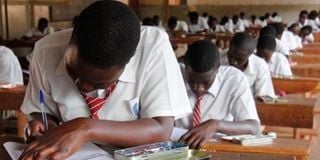Prime
UNEB tells 15,756 students to repeat senior four after failing 2022 exams

Senioir four students sitting their exams recently. The Uganda National Examination Board (UNEB) has reported a reduction in the failure rate after the candidates who sat for the 2022 Uganda Certificate of Education (UCE) posted better performance than their colleagues who sat for the same examinations in 2020. PHOTO/ FILE
The Uganda National Examination Board (UNEB) has reported a reduction in the failure rate after the candidates who sat for the 2022 Uganda Certificate of Education (UCE) posted better performance than their colleagues who sat for the same examinations in 2020.
Releasing the exam results Thursday, the board’s executive director, Mr Dan Odongo said a total of 345,695 candidates sat for the examinations out of 345,945 who registered for the examinations.
Out of these, 46,667 passed in division one,76,745 in second division,88,690 in third division and 117,837 passed in division four.
A total of 15,756 failed the examinations and are expected to repeat senior four if they wish to proceed to senior five, Mr Odongo said.
However, he noted that there is an improvement in performance of candidates this year given an increase in the number of candidates who passed in division one and others consecutively.
According to him, there is an improvement in performance in the large entry subjects except in Christian Religious Education, Biology and Commerce.
Mathematics showed better performance at the Distinction level, but declined overall. English language improved at credit and overall Pass levels but declined at the distinction level.
Performance in Biology has continued to decline as seen in the last few years.
“Worth noting is that, performance in Physics and Chemistry has improved, although the overall pass levels are still low. Over 40% of the candidates have not passed the two subjects,” Mr Odong said.
Language deficiency
UNEB noted that this year, examiners reported better quality work in English language. However, in composition writing, where candidates are expected to exhibit creativity and originality, learners in some schools are still cramming passages from textbooks or what they call “model compositions” with unusual and difficult vocabulary. They then reproduce the crammed passages irrespective of what the composition topic is.
“This practice is, fortunately, declining, because candidates who do this are punished. IN the Comprehension passage, candidates found difficulty in extracting appropriate information to use to correctly answer the questions based on the passage. There are also weaknesses in using the correct grammar in sentence construction. The essential skill of extracting main ideas from a passage and writing out a coherent summary presents a major challenge to most candidates,” Mr Odongo said.
According to him, the challenge of language deficiency is reflected in performance in other subjects, where Chief Examiners continue to report failure by the candidates to interpret the demands of the tasks set, failure to follow instructions, misunderstanding key words used in the stem of a question, and generally poor language expression.
Performance in Science practicals
In Sciences, the problems have remained the same as in recent years, according to the national examination body.
Candidates showed weaknesses in the handling of apparatus during the practical tests.
The weaknesses were also shown in making and recording observations and drawing conclusions from those observations; tabulation of experimental results and interpretation of the results to meet the demands of the question, according to the board’s executive director.
“They also showed poor Mathematical skills required in calculations, inability to write the correct symbols of elements, formulae of compounds and equations, among others. Many candidates take measurements and tabulate the readings and stop on that, being unable to do anything else with the tabulated data. There is a practice, probably encouraged by teachers, where a candidate takes the first reading, and then for the subsequent readings, the candidate merely adds a fixed value adds a fixed value, ending up merely forged figures of experimental results in the practical papers,” Mr Odongo said.
According to him, a lot of candidates showed lack of practical experience in handling the apparatus as many schools tend to handle practical aspects of the curriculum much later in the course. As a result, students do not develop the necessary skills.
“This could explain why most malpractice cases are in Science practical papers,” he added.
Performance in higher order questions
Mr Odongo said candidates do better in questions which require mainly knowledge and understanding (Low Order questions).
Higher Order questions which require candidates to apply knowledge in problem solving situations, draw inferences or make predictions from observations or a set of data are not done well.
“This has been persistent over the years,” he observed.
How to get results
Heads of UCE examination Centres can download the results from their portals as
soon as they are released.
"No hard copy result lists will be issued from UNEB offices until conditions are more favourable. Examination centres will be notified accordingly," Mr Odongo said.
Candidates, their parents and any other person wishing to access results may do so through their mobile phones. Go to the ‘Message’ menu and type UCE, leave space, then type the correct index number of the candidate; e.g. U0000/001.
Send to 6600 on the MTN and AIRTEL networks.




